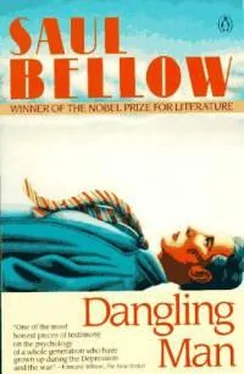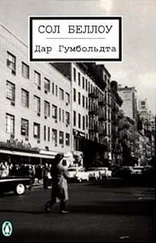Сол Беллоу - Dangling Man
Здесь есть возможность читать онлайн «Сол Беллоу - Dangling Man» весь текст электронной книги совершенно бесплатно (целиком полную версию без сокращений). В некоторых случаях можно слушать аудио, скачать через торрент в формате fb2 и присутствует краткое содержание. Жанр: Современная проза, на английском языке. Описание произведения, (предисловие) а так же отзывы посетителей доступны на портале библиотеки ЛибКат.
- Название:Dangling Man
- Автор:
- Жанр:
- Год:неизвестен
- ISBN:нет данных
- Рейтинг книги:4 / 5. Голосов: 1
-
Избранное:Добавить в избранное
- Отзывы:
-
Ваша оценка:
- 80
- 1
- 2
- 3
- 4
- 5
Dangling Man: краткое содержание, описание и аннотация
Предлагаем к чтению аннотацию, описание, краткое содержание или предисловие (зависит от того, что написал сам автор книги «Dangling Man»). Если вы не нашли необходимую информацию о книге — напишите в комментариях, мы постараемся отыскать её.
Dangling Man — читать онлайн бесплатно полную книгу (весь текст) целиком
Ниже представлен текст книги, разбитый по страницам. Система сохранения места последней прочитанной страницы, позволяет с удобством читать онлайн бесплатно книгу «Dangling Man», без необходимости каждый раз заново искать на чём Вы остановились. Поставьте закладку, и сможете в любой момент перейти на страницу, на которой закончили чтение.
Интервал:
Закладка:
He thought he had found those others, but even before the Servatius party he (or rather I) had begun to have misgivings about the progress that was being made. I was beginning to see that a dittcult plan or program like mine had to take into account all that was natural, including corruptness. I had to be faithful to the facts, and corruptness was one of them.
But the party shocked me.
I did not want to go. It was Ira who insisted, out of loyalty to Minna Servatius and because she knew what it was to be a disappointed hostess. It was a long time since a party, any party, had given me pleasure. I liked nothing better than to see my friends singly or in pairs, but when they came together in a large group they disheartened me. You knew what to expect beforehand. If there were jokes, you knew how they would be told; if there were exhibi. tions, you knew who would make them and who would be hurt or shamed or gratified by them. You knew what Still-man would do, you knew what George Hayza would do, you knew that Abt would make fun of everyone and that Minna would have difficulties with her husband. You knew there was bound to be mischief, distortion, and strain, and yet you went. And why? Because Minna had prepared a party; because your friends were going to be there. And they were coming because you were going to be there, and on no account must anyone be let down.
When the heat and stridency of the party burst upon us through the open door, I began to regret that I had not been more firm in refusing, this once. Minna met us in the entry hall. She was wearing a black dress with a high, silver-trimmed collar; her legs were bare, and she had on high-heeled, red sandals. It was not immediately apparent how drunk she was. She appeared, at first, self-possessed and grave; her face was white, her forehead full of creases. Then we noticed how she was perspiring and how unsteady her eyes were. She looked first at Iva and then at me, saying nothing. We did not know what to expect.
Then, with alarming suddenness, she cried, "Sound the gong; they're here."
"Who?" said JaCk Brill, putting his head out of the door.
"Joseph and Ira. Always last to show up. They come when everybody's high so they can stand around and watch us make fools of ourselves."
"It's my fault," Ira murmured. We were both taken aback by Minna's outcry. "I have such a cold, and…"
"Darling," said Minna. "I was only joking. Come in." She led us into the living room. There, both doors of the phonograph were open, but the guests talked; no one seemed to listen to the music. And here was the scene, predictable to the last detail, hours, days, weeks before the light furniture in the popular Swedish style, the brown carpet, the Chagall and Gris prints, the vines trailing from the mantelpiece, the bowl of Cohasset punch. Minna had invited a number of "stranger" acquaintances, that is, who did not belong to the inner circle. There was a young woman to whom I had once been introduced. I remembered her because of her downy, slightly protuberant lip.
She was quite pretty, however. Her name escaped me. Did she work in Minna's office? Was she married to the fat man in the steel-rimmed glasses?
Had I also met him? I would never know. And in this noise I could not help being indifferent about it. So it was with these strangers. Some, like Jack Brill, you came to know well, in time. The others remained grouped together indistinctly and were recalled, if the need arose, as "that fellow with the glasses" or "that pasty-looking couple."
One by one, the friends came forward-Abt, George Hayza, Myron, Robbie Stillman.
They were the center of the party; they performed. The others looked on, and who could tell whether they were amused or resentful at their exclusion, or even if they were aware of being excluded? The party went on around them.
If they were aware of what was happening, they made the best of it.
And so did you. Your first tour of the room done, you moved aside with a glass and a cigarette. You sat-if you could find a place-and watched the performers and the dancers. You heard Robbie Stillman tell a story he had told any number of times about the mishaps of a stuttering girl, or about a hobo with a new. portable radio he had met one day on the steps of the Aquarium. You did not like him less for telling it. You felt, somehow, that he, too, was forced to endure it, that he began unwillingly and was under a compulsion to finish what no one wanted to hear finished. You could not blame him.
Minna went around the living room from group to group, unsteadily, as if in danger of falling from her high heels.
Finally she stopped before George Hayza. We heard them arguing. It turned out that she wanted him to recordon the machine a poem he had made popular years agowhen he had played at being a surrealist. To his credit, herefused That is, he tried to refuse, reddening and sniilingddanxiously.
He wanted to live it down. Everybody was tired of it, he most of all. Others came to his support. Abt sdI@ccwith an edge of impatience in his voice, that George ought @ccffbe allowed to judge whether or not he should recite x. and since everyone had heard it-a dozen times @.@.8Everyone has not heard it," said Minna.
"Besides, I want to make a record of it. It's clever."
@' "It used to be considered clever."
"It still is. It's very clever.8Abt gave up the argument, for a sense of a special situation was arising. Abt had once been engaged to Minna, butfor reasons none of us knew, she had suddenly decided tomarry Harry Servatius. There was, therefore, a complex@cchistory of injured feelings between Abt and Minna, andeaIn a gathering atmosphere of embarrassment, Abt withdrew, and Minna had her way. The poem was recorded.8George's voice came out strangely high and unsteady. "I am aloneAnd eat my hair as a calendar of regrets" George, with a grimace of apology, backed away fromthe phonograph. Only Minna was satisfied; she played therecord again.8What's wrong tonight?" I asked Myron.8Oh-it's Harry, I guess. He's in the study with GildaHillman. They've been there all evening.
Talking.88Joseph," said Ira from her chair near by, "willyou getme some more?" She held out her glass.
"Iva," said Jack Brill, with a warning laugh. "Go slow."
"With what? The punch?"
"It tastes mild, but it isn't mild at a11."
"Maybe you shouldn't drink any more of it," I said, %incc you're not feeling well."
"I don't know why I'm so thirsty. I haven't eaten anything salty."
"I'll bring you some water if you like."
"Water." She drew back the glass contemptuously.
"I wish you wouldn't drink tonight. It's a strong punch," I said. My tone was unmistakable. I did not mean to be disobeyed. Yet a little later I saw her at the bowl and frowned at the quick motion with which she raised her arm and drank. I was irritated enough to consider, for a moment, striding up and snatching the glass away.
Instead I started a conversation with Abt on the first subject that came to hand, the war in Libya. We wandered into the kitchen, talking.
Abt is one of my oldest and best friends. I have-always been much attached to him and have valued him perhaps more than he has valued me. That does not make much difference; he certainly has great affection for me, and some respect. At college we roomed together for a while. We were temporarily estranged because of a political matter. When we returned to Chicago we resumed our friendship, and while he worked for his doctorate-comuntil last June he was an instructor in political science-comhe practically lived with us.
"We owe a lot to the Italians," Abt was saying. "They have a sensible attitude toward the war.
They want to go home. And that isn't our only indebtedness. Capitalism never made them the victims of addition and subtraction. They remained a thoughtful people." (he spoke slowly, o that I knew he was improvising, an old habit of his.) "And they never became swashbucklers. They have better taste and less false pride than the heirs of Arminius. Of course, that was an Italian mistake. Tacitus inflated the Germans '@.
Читать дальшеИнтервал:
Закладка:
Похожие книги на «Dangling Man»
Представляем Вашему вниманию похожие книги на «Dangling Man» списком для выбора. Мы отобрали схожую по названию и смыслу литературу в надежде предоставить читателям больше вариантов отыскать новые, интересные, ещё непрочитанные произведения.
Обсуждение, отзывы о книге «Dangling Man» и просто собственные мнения читателей. Оставьте ваши комментарии, напишите, что Вы думаете о произведении, его смысле или главных героях. Укажите что конкретно понравилось, а что нет, и почему Вы так считаете.







